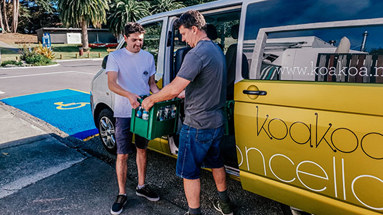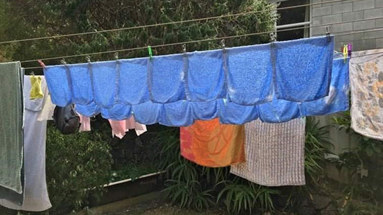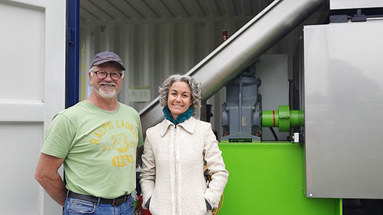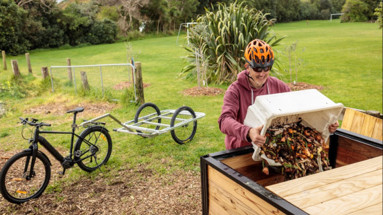Waste levy grants
Waste Levy Grants support projects that increase the range, scale and number of waste minimisation activities on the Kāpiti Coast.
They're funded by part of the Waste Levy fees paid by waste disposal operators to the Ministry for the Environment, which is then allocated to local bodies to administer. There is no rates funding involved.
We've announced the organisations receiving funding in our 2025 funding round – see latest recipients for details.
About waste levy grants
Waste Levy Grants help fund projects that reduce waste in our district. There are two main categories: business waste reduction projects and community projects.
From March 2026, a new Small Community Grants round will be added. This means there will now be four funding rounds instead of three, across four categories. Small Community Grants are expected to be available on demand from early 2026 rather than just once a year.
We especially encourage projects that:
- move up the waste hierarchy towards a circular economy
- support a low-emissions, low-waste society that’s inclusive and fair
- reduce the amount of organic waste going to landfill
- reduce, rethink and redesign
- reuse, repair and repurpose
- protect and regenerate natural systems
You can learn more about waste minimisation in our reusing, recycling and waste section.
Funding is available for projects (or parts of projects) that take place within the Kāpiti Coast District.
Timeline
We expect this grant to open:
- Winter 2026 (TBC)
How to apply
Applications are made online when the grant round opens.
Select the grant category below to see eligibility criteria and what you can apply for.
This fund is designed to assist existing businesses in implementing measures that will lead to long-term and measurable minimisation of waste from their own operations and its open for Businesses, Organisations and Social Enterprises.
Funds available: A funding pool of $20,000 is available for business waste reduction projects in 2025/26. There is no rates funding involved. Businesses must co-fund at least 50% of eligible project costs.
Eligible projects can include (but are not limited to):
- Equipment needed to achieve the project outcomes (submit two quotes per item of equipment, where possible).
- Publicity or educational material directly related to the aims of the programme.
- New initiatives or improvements/expansions to existing programmes using proven technologies.
- Trials and pilot programmes using proven technologies.
- Training needs of workers.
- Skill development of project participants.
- Administration costs related to the project.
- Wages directly related to the project.
- Travel costs (travel will only be funded if it is essential for the project, and each journey will be evaluated on its individual merit).
The following purposes will not be funded:
- Feasibility studies.
- Waste disposal, treatment, or recycling costs.
- Ongoing financial support of existing activities or running costs.
- Duplication of other demonstration projects or pilot studies.
- Debt servicing.
- Retrospective projects/work that has already been completed.
- Legal expenses.
- Any costs related to preparing the application.
- Catering costs.
Criteria
The project proposal must include the following:
- How waste reduction success will be measured. Success must be quantifiable and reported back to the Council (Council staff are available to provide guidance on reporting methodology).
- An estimate of cost savings resulting from the project. Priority will be given to projects where expected savings are not sufficient to cover project costs.
- A plan for how the project will be developed, marketed, and managed (if applicable).
- The proportion of project funding being sought and how any remaining proportion will be funded.
- Details of any other sources of funding or sponsorship, or applications made for such.
- Proof of an entity, organisation, or project bank account requiring multiple signatories.
Key policy changes for upcoming rounds:
- The Funding cap has been increased from $20,000 to $50,000 for the 2026–2027 financial year. The co-funding requirement has also been reduced to 25%, down from the previous 50%.
This fund is designed to support practical waste minimisation projects that:
- Encourage community participation and education.
- Benefit the Kāpiti Coast community.
- Lead to long-term waste minimisation actions and behaviour change.
The fund is available to Community groups, Businesses, Iwi/Māori organisations, Educational institutions, Neighbourhood groups of at least five households, Other community-based organisations
There is a funding pool of $30,000 available for community projects in 2025/26.
Eligible purposes may include (but are not limited to):
- New programmes, projects, or events that promote waste minimisation.
- Improvements or expansions to existing programmes.
- Equipment necessary to achieve the programme’s outcomes (two quotes per item are required, if possible).
- Publicity or educational material directly related to the programme's objectives.
- Training needs of workers involved in the project.
- Skill development of programme participants.
- Administration costs and project-related expenses (up to $500).
- Wages that are directly related to the project.
Ineligible purposes – the following will not be funded:
- Applications that do not align with the purpose of the Waste Levy Policy and its guidelines.
- Waste disposal, treatment, or recycling costs.
- Ongoing financial support or running costs of activities (recurring activities like waste minimisation at public events may be funded for a maximum of two years, but no more).
- Subscriptions and memberships.
- Debt servicing.
- Projects or costs that have already occurred.
- Costs involved in preparing the application.
- Catering costs.
Key policy changes for upcoming rounds:
- Funding pool increased from $30,000 to $50,000 for the 2026–2027 financial year (next grant round opens winter 2026).
Funding requirements and reporting
Financial details
- GST: If you’re registered for GST, leave GST out of your project costs.
- Quotes: For equipment purchases, include two quotes to support your application.
- Bank account: If your group doesn’t have a project bank account yet, you’ll need to set one up if you’re approved for funding.
Once approved, we’ll send you a simple funding agreement to sign and ask for proof of your project bank account so we can transfer the grant. Some funding may be paid in stages, depending on your project.
Reporting
- Start your project within three months of approval (unless you’ve arranged otherwise with us).
- Short-term projects should be finished within 12 months; longer projects need to show agreed progress in that time.
- When you’re done, send a short final report — including proof of purchase for any funded equipment or travel.
Other conditions
Council reserves the right to:
- visit any project or use it for promotional purposes where grant assistance has been given; in principle the applicant will be notified of a visit
- suspend and refuse further grant payments if, in our opinion, the grantee wilfully or through neglect causes the project to fail; our decision is final and will be no rights of appeal or review, and no right to compensation or damages of any nature.
Let us know:
-
If you want to make any big changes to your project plan, budget, or equipment before going ahead.
- If a project can’t continue or ends early, we may ask that any equipment bought with the grant be returned or passed on to another local waste minimisation project.
Contact
If you have any questions, or would like to discuss your project or application further, you can phone a Waste Minimisation Advisor or email them at [email protected].
Latest recipients
Community Projects Grants recipients 2025/26
Kāpiti Art Studio and Te Ara Korowai
Received $5,785.00 to deliver a series of workshops upcycling clothing, specifically jeans and t-shirts. The programme includes four 10–11 week blocks of adult workshops, and three one-off sessions for kindergartens, primary schools, and colleges. Workshops will be led by Rebecca Bond, a Kāpiti-based environmental artist, 8- time World of Wearable Art finalist, and community arts advocate, and Arathena Kenedy, a skilled textile artist passionate about creative reuse.
Mary Potter Hospice
Received $733.01 to purchase reusable table cloths for The Kapiti Strawberry Festival. Based on recommendations from Organic Wealth who undertook waste minimisation at the previous event, single-use table cloth usage was a preventable waste stream that could be eliminated by introducing reusable table cloths.
Raumati Technology Centre
Received $3,859.00 to deliver a series of workshops 'Closing the loop', and to set up a worm farm. The technology centre is currently accessible to 11 different primary schools catering to over 1000 students per year. This project is likely to lead to long-team waste minimisation actions and behaviour change by participants
Kāpiti College
Received $1,300.00 to conduct a waste audit of the schools waste streams and report with recommendations. This will be used as the foundation of future waste minimisation projects that the school can undertake.
Paekākāriki Stuff Library
Received a part-funding of $5,000.00 to set up and run a community 'stuff' library in Paekākāriki
Watch how past grants are making a difference
Watch short videos showcasing some of our past grant recipients and how their projects have helped reduce waste in our district.
 In early 2021, local award-winning liqueur and spirit-maker Koakoa secured a $4596 Waste Levy grant from the Business Waste Reduction category. It is now doubling down on its spirit crates system as it ramps up its sustainability commitment.
In early 2021, local award-winning liqueur and spirit-maker Koakoa secured a $4596 Waste Levy grant from the Business Waste Reduction category. It is now doubling down on its spirit crates system as it ramps up its sustainability commitment.
The spirit crates system was initially launched in 2019 by co-owners Chris Barber and Bec Kay in their response to the excessive amount of cardboard and glass being discarded in the hospitality sector after just one use.
The Waste Levy grant has enabled them to purchase an additional 200 plastic crates, doubling the scheme.
After the gin, vodka and limoncello is delivered in the green plastic crates, their hospitality clients return used bottles (in the crates) to the factory. After being washed, sanitised, and refilled the bottles are returned to their clients. Each bottle is used up to seven times before ultimately heading for recycling.
Chris Barber, co-Owner of Koakoa, says to date their scheme has saved almost 2000 bottles from being discarded after just one use, delivering more than just financial savings.
“With the support of the new grant, we can now double the impact and the savings. It will reduce our environmental footprint further and help our customers reduce theirs.”
Koakoa’s bottle swap scheme addresses the top of the waste hierarchy: Reduce and Reuse, and is actively contributing to Kāpiti’s growing circular economy.
Image: Chris Barber from Koakoa receiving the empty bottles back from Tom at Longbeach in Waikanae.
 Paekākāriki Playcentre is a not-for profit parent-run early childhood centre who saw a need to say goodbye forever to the mountains of paper towels they were throwing away.
Paekākāriki Playcentre is a not-for profit parent-run early childhood centre who saw a need to say goodbye forever to the mountains of paper towels they were throwing away.
The Community Project funding they received in 2019/20 from Council meant they could purchase reusable, cotton hand towels instead, saving money and reducing waste.
They haven’t needed to buy any paper towels for either their bathrooms or the kitchen since they got the cloth towels, and parents support the mahi by taking them home and washing them.
They estimate this small change has replaced the need for 16,000 paper towels!
Playcentre parents have found that putting the cloth towels into their existing paper towel dispensers makes them easy to use – kids just pull one out and then put them into the wash baskets.
They have also noticed this has sparked some great conversations about sustainability with the children – talking about the planet’s resources being limited and trying to conserve them as much as possible through reuse.
 Waste minimisation company Earth Starch Waste Solutions are trialling a rapid treatment facility, which turns organic waste into rich fertiliser with no bad odour, vermin or toxic waste – all within a matter of hours!
Waste minimisation company Earth Starch Waste Solutions are trialling a rapid treatment facility, which turns organic waste into rich fertiliser with no bad odour, vermin or toxic waste – all within a matter of hours!
Turning food and green waste into usable fertiliser makes a difference by reducing the methane it would release if it went to landfill instead.
Earth Starch Waste Solutions received $22,880 from the Seed funding category in the 2019/2020 Waste Levy Grant round. This has gone towards equipment for an innovative reactor which uses heat and a 100% organic enzyme to turn food and green waste into a highly nutritious compost within hours. The concept is being trialled in Kāpiti so in the future more Earth Starch treatment facilities will cost-effectively turn organic waste into garden gold.
 The Paekākāriki Community Orchard and Gardens (POG) community group have developed a village-wide composting initiative, which collects household food scraps and turns them into compost for the community garden’s fruit trees. This initiative reduces the volume of food scraps heading to landfill to generate harmful leachate and methane.
The Paekākāriki Community Orchard and Gardens (POG) community group have developed a village-wide composting initiative, which collects household food scraps and turns them into compost for the community garden’s fruit trees. This initiative reduces the volume of food scraps heading to landfill to generate harmful leachate and methane.
“We were staggered to learn that 28 percent of Kāpiti's kerbside rubbish collection is kitchen scraps. When added to landfill, these resources generate leachate and methane that contribute to environmental pollution and climate change. Council funding means we now have an awesome e-bike and trailer for collecting scraps and two large composting bins in the Paekākāriki Community garden,” says POG member Doris Zuur.
“We’re predicting that using this service to recycle food scraps may also allow locals to rent a smaller rubbish bin each month too.”
Image: Paekākāriki Community Orchard and Gardens (POG) member Spencer Crocker empties locally collected compost into the community bin.
Previous recipients
Browse past Waste Levy Grant recipients to see the types of projects we’ve supported in previous funding rounds.
Ōtaki College
Received $2,116 for a project aimed at providing sustainable period products for students. The initiative supports waste minimisation by promoting reusable alternatives.
Raumati Technology Centre
Bike Yard Kāpiti Charitable Trust (Cyclic Solutions)
Received $2,000 for the refurbishment and recycling of bicycles and components, promoting a circular economy and reducing waste from discarded bikes.
Te Kura ā Iwi o Whakatupuranga Rua Mano
Received $4,602 for the sourcing of recovered/recycled building materials. This initiative supports sustainable construction practices by using materials that would otherwise go to waste.
Paekākāriki Orchard Group
Received $5,000 to promote and expand the PaeCycle Project, a community-led initiative focused on reducing food scraps through a collection and recycling programme.
Ōtaki Women’s Community Club
Received $800 for Organic Wealth waste minimisation expertise, helping to expand local food scrap collection and composting efforts.
Worm It Up
Received $4,500 to expand their kitchen scraps composting subscription service, helping more households divert food waste from landfills.
He Iti nā Mōtai
Received $811 for eligible composting expenditure, supporting a local initiative to reduce organic waste through composting systems.
Māoriland Charitable Trust
Received $2,500 to support reuse initiatives at the Māoriland Film Festival, promoting waste reduction and sustainability at the event.
Katihiku Marae Committee
Received $1,000 for the installation of colour-coded bins and signage, aiming to improve waste segregation and recycling practices at the marae.
Juli Hunter Eco Friendly Style
Received $2,940 to run regular sewing classes that teach the community skills in repairing and visible mending, aiming to reduce textile waste. The classes will be held monthly for groups of 10 people, providing practical, hands-on lessons.
Kāpiti Softball Club
Received $2,230 to establish a colour-sorted glass recycling system. The club hosts 5–10 national and local tournaments each season, catering for 200–800 people at these events.
KapiMana Multiples
Received $2,138 to purchase a set of reusable cloth nappies, allowing their members to trial cloth nappies for one month.
Māoriland Charitable Trust
Received $6,980 to support an educational initiative at the Māoriland Film Festival, raising awareness about the environmental impact of single-use packaging through film screenings, an interactive waste diversion installation, and the use of reusable crockery.
Organic Wealth
Received $6,198 to expand their community food scrap collection program. The funding will support trailer modifications, staff training, educational food waste labels, additional compost bins, and diesel costs for expanded operations.
Ōtaki Montessori Preschool
Received $578.12 to set up composting systems, educational recycling posters, and a paper brick maker to teach students about recycling and composting.
Ōtaki School (Te Kura tuatahi o Ōtaki)
Received $1,628 to purchase composting bins and worm farms to process garden and food waste. The project integrates waste reduction into the school’s education and encourages students to share these learnings with their families.
The Shed Project Kāpiti Limited
Received $2,934.39 to support wages for a disabled worker collecting and composting food scraps as part of their food scraps collection service for households and businesses in Paraparaumu and Ōtaki.
Shoebox Christmas Trust
Received $2,421.50 to develop their digital platform and pilot a community-driven food waste reduction campaign, connecting food growers, community gardens, and families with surplus food to organizations redistributing food to those in need.
St Peter Chanel School
Received $753.99 for new composting systems, training, and a greenhouse to reduce organic waste from school meals and educate students and their families about waste reduction.
Anam Cara Gardens
Received $1,101.65 to introduce additional composting systems, including compost bins, worm farms, and bokashi systems.
The Bond Store
Received $2,000 to expand their reusable bottle swap crate system to include more bottle sizes, meeting customer demand.
Energise Ōtaki
Received $8,000 to part-fund a small-scale anaerobic digestion pilot to process organic waste and generate energy for local businesses, public agencies, and households.
Gratitude Kefir
Received $3,488.50 to part-fund the creation of a fully integrated reuse system, including reusable crates and a bottle-washing facility to reduce waste and support waste minimization.
The Roastery
Received $5,403 to part-fund the expansion of their Swap-A-Jar reusables system and provide necessary wash and sanitizing services to support scaling a circular reusables economy.
2020/21
Waitohu School
Received $1,173 to run the annual Waitohu School Fireworks Extravaganza as a zero-waste event.
Ōtaki Montessori Preschool
Received $218 to establish a worm farm to teach tamariki about sustainable living.
Organic Wealth
Received $5,171.04 to expand their food scrap collection service across the Kāpiti Coast for businesses and households.
Raumati South Repair Cafe
Received $4,300 to run regular repair café events in Raumati South throughout 2023.
Māoriland Charitable Trust
Received $8,701.51 to expand composting capacity at the Māoriland Hub’s maara (garden).
Paekākāriki Orchard and Garden/Paecycle
Received $10,094.77 to expand the Paecycle food scrap collection service.
Ngā Manu Nature Reserve
Received $3,165.87 to establish a source-separated waste collection system, allowing visitors to responsibly dispose of their recycling and organics.
Little Earth Montessori Kāpiti
Received $782.28 to purchase cloth nappies.
Ōtaki Boating Club
Received $4,650 to establish a fish processing station for redistributing fresh fish heads and frames to the community.
Ōtaki College
Received $518.23 to set up a composting system in their Horticulture Block.
Ōtaki Kindergarten
Received $263.44 to set up new compost bins and a worm farm.
Our Lady of Kāpiti Primary School
Received $500 to set up a three-bin system onsite.
Raumati South Kindergarten
Received $282.61 to set up a worm farm.
Raumati South Technology Centre
Received $2,140.47 to establish a composting system.
Raumati Village Community Garden
Received $720 to upgrade their compost bins.
Small Wonders Childcare Centre
Received $608.86 to set up compost tumblers and a worm farm.
Te Kura Kaupapa Māori o Te Rito
Received $3,488.94 to expand the Ōpara Initiative.
Te Puna Oranga o Ōtaki
Received $700 to set up worm farms at Te Puna Oranga o Ōtaki and Raukawa Marae.
Zero Waste Ōtaki
Received $5,284.25 to purchase a 20-foot container cover to create covered yard space at their timber recovery site.
Kāpiti Waldorf Trust
Received $4,800 to upgrade Te Ra Waldorf School’s onsite composting system with two CarbonCycle bins.
Paekākāriki School and Garden Group
Received $4,000 to upgrade their compost pallet bins and develop a compost education program.
Paraparaumu College SEAR Group
Received $1,700 to establish aluminium can recycling at Paraparaumu College.
Māoriland Charitable Trust
Received $1,240 to deliver community and business waste education for the Māoriland Film Festival.
Ōtaki College
Received $3,100 to set up a plastic recycling station in their technology class.
Figgy & Co
Received $3,027.50 to transition to using New Zealand post-consumer recycled plastic bottles.
Te Wānanga o Raukawa
Received $3,375.39 to rehome excess office furniture through All Heart NZ after their campus redevelopment.
Koakoa
Received $4,596 to source 400 reusable crates to extend their bottle return scheme.
Māoriland Charitable Trust
Received $3,000 to add two NZBox composters to the Māoriland Hub maara (garden) to increase composting capacity for local businesses and the community.
The Kai Ora Initiative
Received $10,486.18 to establish a food and garden waste collection service for residential and commercial clients centred around Paraparaumu East.